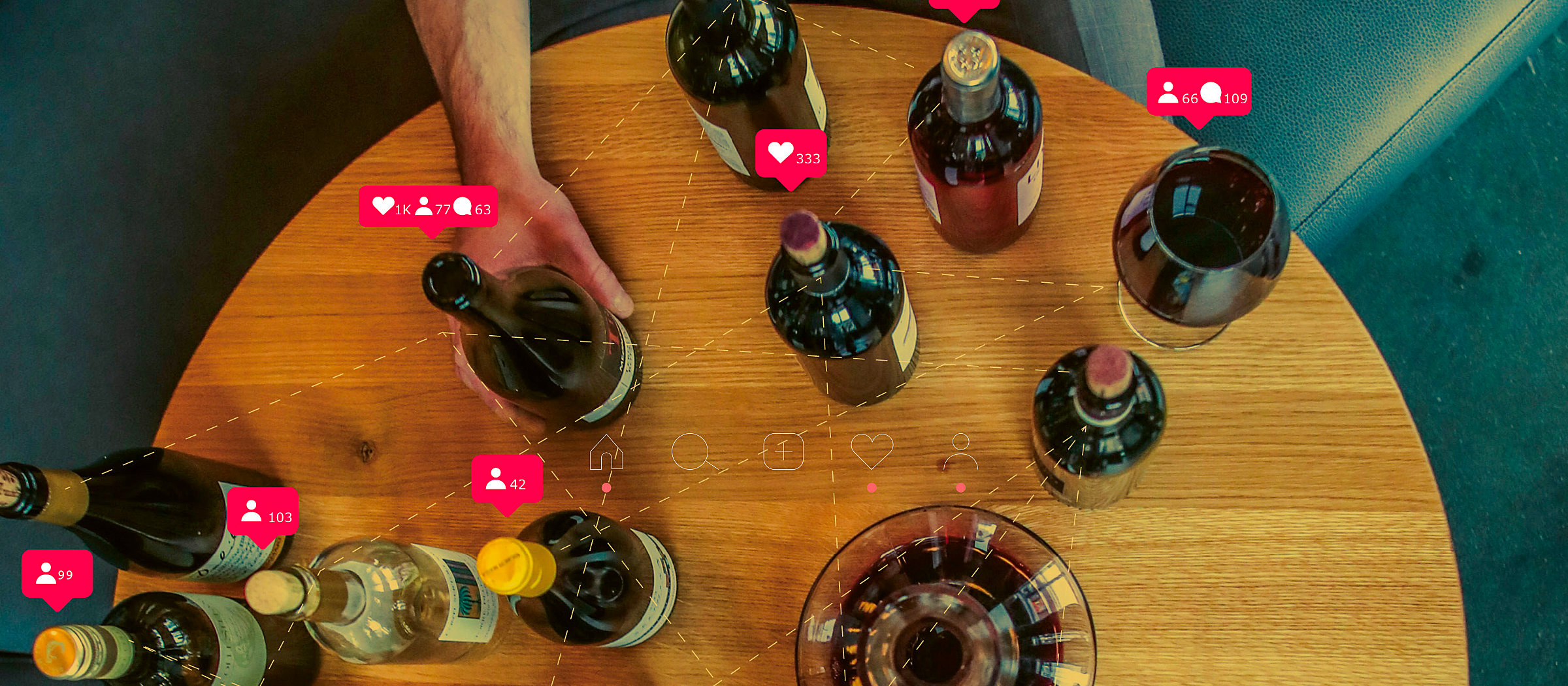The New Gastronome
Scroll into Wine
Wine Communication Through Social Media
by Nancy Monperousse, Emanuele Trono, Luca Santoro
by Nancy Monperousse, Emanuele Trono, Luca Santoro

There’s a disparity between the wine culture and communication that surrounds a novice and an expert, but, with social media’s impact on communication, which allows messages to be sent and received in a nanosecond, it’s becoming easier to place a beginner and an expert in the same room, so to speak. There’s a new wine culture that’s emerging through social media and all levels are welcome, from beginners to experts, to enthusiasts and producers.
We checked in with Emanuele Trono, founder of Enoblogger and Luca Santoro, digital entrepreneurs and co-founders of NotJustWine, to find out how they’re using their brands to become the authority on educating and guiding young people, wine lovers, and winemakers on various aspects of wine communication, with the help of social media.
Emanuele Trono: I’m Emanuele Trono, a former UNISG student of the Master in Italian Wine Culture who has seen, in digital, an important opportunity to talk about wine. My project, called “Enoblogger”, was born on Instagram and my goal is to make wine communication a little easier and simpler for everyone. My online community includes a diverse audience of wine enthusiasts who are located throughout the world and that interact with me.
Luca Santoro: My name is Luca Santoro, I am a gastronome, a digital entrepreneur, and, together with Matteo Micotti, I am the co-founder, of one of the most important wine communication brands in Italy, “NotJustWine“. NJW is a start-up company, founded in 2017, with the intention of revolutionizing a world that is seated, old and attached, to the modus operandi of the past, with an ancient dogma of education, business, and thoughts like that of wine, through social media. We influence people on their purchases and we launch trends.
A. D. V. E. R. T. I. S. I. N. G.
Why do you think social media could potentially influence one’s perception of wine:
Emanuele Trono: The concept of social media must be seen as a megaphone – I launch a message, and immediately, the message reaches many people simultaneously – and even more surprisingly, instantly. I think that there was probably a need for the wine world to break down the elitist barriers that were imposed on it, through the use of the digital world, in order to get closer to everyone in a democratic way. Social media is just that – it’s extremely democratic. If I don’t like the content or a way of communicating doesn’t represent me, I can simply unfollow. We are also in an era where people want to see the faces of the users that communicate something to them, in front of them, and they want to understand that they can trust in the person.
Luca Santoro: We have worked with many wine companies, and whatever their philosophy is, it must refer to their audience. It must capture, educate, and train their audience, commercially, by speaking to them on the web. Right now, wine marketing through social media is a dynamic, young, easily influenced, and stimulating category. With social media, we are talking about a range of people who have a greater means of communication and learning than our grandparents did. We will begin to guide them into the oenological future – now – with one “click”, and that one “click” has a lot of information at hand to draw on, and takes very little time.
Who makes up your audience and how are you meeting their need(s)?
Emanuele Trono: Social media gives everyone the opportunity to express themselves and my audience (usually between the ages of 18-30) includes over 80 thousand active wine enthusiasts who interact with me online. It’s a diverse audience with 75% divided into the following countries: USA, France, Brazil, UK, Germany, and we have a lower percentage of audiences in other countries. Research shows that my followers are interested in wine, researching online, and have a concept of spending money on quality products. They prefer to spend more on high-quality wines and this is an extremely positive result for the market because it means that there is an increase in culture and awareness in tasting quality products. The pursuit of quality must not be confused with a way of communicating that is reserved for few, but rather, must open up and reach as many audiences as possible. I provide that reach and my audience recognizes this.
Luca Santoro: We have 33 thousand Instagram subscribers and about almost half of them are Italian and American. Speaking in numbers, 30% of that audience is Italian and 16% is American. Of the 30% of the Italian slice, 24% are really interested and active; about 6% are interested and active in the US. This is probably because our target audience (which is usually between the ages of 18-35) are not yet open-minded enough to accept such a radical change of communication, which is precisely why they are being approached in the European wine world. Italians, who are increasingly moving online, vary their taste and change their thinking on something that is truly cultural, as to the approach to wine. Here, this phenomenon of change and desire for knowledge among my countrymen really makes me happy.
How did Instagram impact your goal?
Emanuele Trono: The tool is right in front of us and we must understand it and not ignore it or fear it. The mental approach we must use is that of not understanding our market to the end (I social), but of shaping the way we communicate, based on the trends that are sensed by the market. There is an important work of data analysis and study of strategy behind communication and message choices. And, the results that we’ve had make us understand that online, there is an audience that seeks experiences and is willing, in a short time, to make participation or purchasing decisions. This is an incredible potential that the world of wine cannot ignore as a passing phenomenon or as not important.
Luca Santoro: NotJustWine receives about one million views, every month, on Instagram. So, let’s focus on understanding what actually will change between the consumer and the wine that they drink from the moment they spend time on social networks on their mobile devices. Once they open Instagram, for example, and look for a brand then open the profile, they look at photos, videos, explanations. They may leave a “follow” and then they’re done. But, they have been engaged! Going forward, their perception of wine will be influenced by what we say. Mind you, no one is forcing them. They’re doing it in a democratic and free way, just like the Web. If you check the companies that are featured on our online feed, you will see that our advice and opinions have already affected their next purchase. We obviously do not count as much as the various critics such as Suckling or Parker – we do not have their experience; we do not work the same way; we are different “brands”, but we reach a large audience and we are bringing them our own way of seeing wine.

What challenges have you encountered and do you offer any solutions to these challenges?
Emanuele Trono: Our consumers prefer to spend more on high-quality wines and this is an extremely positive result for the market because it means that there is an increase in culture and awareness in tasting quality products. However, the pursuit of quality must not be confused with a way of communicating that is reserved for the few, but rather, must open up and reach as many audiences as possible. This was understood by the large and important companies with whom I collaborate with. They believe in digital and have understood how much conversion there is if you start working immediately on the young audience, which is true, presently, and will continue to be true in the future. As for small companies, the results can be even more surprising. Some small companies that I collaborate with are case studies of events with consequent purchase of wine in the company, that was sold out in only 24 hours after these products were exclusively launched on Instagram and Facebook. The world of e-commerce makes incredible numbers.
Luca Santoro: Although our advice and opinions influence our followers with their next purchases and this has a lot of importance in the wine marketing of every company, unfortunately, not everyone knows it. Sometimes, even those who are watching it, perceive it, but subconsciously, they’re influenced. There is an abysmal difference between the US and Italy, in this area. Americans are less influential because the United States is the market of Barolo, Brunello, Montrachet, Bordeaux and the great wines of the world, the great varieties, the Pinot Noir, the Chardonnay; so, it’s difficult to move the public opinion away from these concepts of preference. There are not even figures like Wine Influencer, but instead, master sommelier and world experts, of a classic style to whom the way of perceiving and wanting the wine is now linked. The U.S., therefore, remains the most flourishing market where you can sell your Amarone della Valpolicella, but not the one in which an influencer shaved freshly graduated in Gastronomic Sciences recommends a Malvasia di Candia or an Aligoté di Benoit Ente, instead of a noble Puligny-Montrachet or Vosne Ronamèe.
What would you like to happen, in the future, in the wine industry as it relates to your goals and social media/networking?
Emanuele Trono: My advice to start positioning for the future is to embrace the social revolution and for more wine producers to start communicating with an audience that is hungry for information and emotions – and we know that wine is a great vehicle for emotions.
Luca Santoro: We are proud admirers of those who love their wine and their land but at the end of the day, we are increasingly looking for a slow wine, slow agriculture and slow production, in a strategically fast market. We are facing a phenomenon like the digital one in the world of wine, and while it’s not a primary necessity like food or water, it does provide positive effects and it should be communicated through innovative methods. The Web is democratic. I will always like this, so, let yourself be influenced by whoever you want; listen to various opinions, but then elaborate your thoughts and your vision. Remember, however, that if you buy a wine that we have recommended to you, that will always be our greatest victory.
